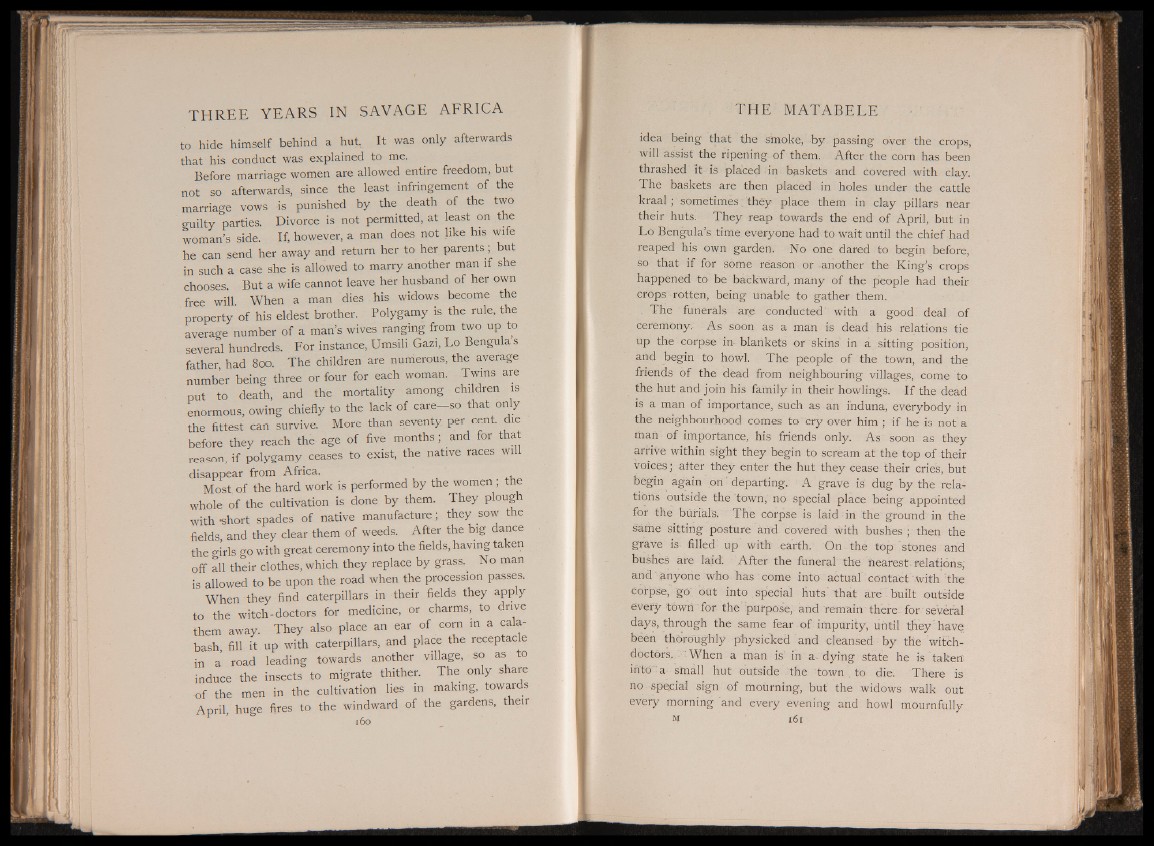
to hide himself behind a hut, It was only afterwards
that his conduct was explained to me.
Before marriage women are allowed entire freedom, but
not so afterwards, since the least infringement of the
marriage vows is punished by the death of the two
cruilty parties. Divorce is not permitted, at least on the
woman’s side. If, however, a man does not like his wife
he can send her away and return her to her parents; but
in such a case she is allowed to marry another man if she
chooses. But a wife cannot leave her husband of her own
free will. When a man dies his widows become the
property of his eldest brother. Polygamy is the rule, the
average number of a man’s wives ranging from two up to
several hundreds. For instance, Umsili Gazi, Lo Bengula s
father, had 800. The children are numerous, the average
number being three or four for each woman. Twins are
put to death, and the mortality among children is
enormous, owing chiefly to the lack of care-so that only
the fittest can survive. More than seventy per cent, le
before they reach the age of five months; and for that
reason, if polygamy ceases to exist, the native races wi
disappear from Africa.
Most of the hard work is performed by the women ; the
whole of the cultivation is done by them. They plough
with •short spades of native manufacture; they sow the
fields, and they clear them of weeds. After the big dance
the girls go with great ceremony into the fields, having taken
off all their clothes, which they replace by grasa No man
is allowed to be upon the road when the procession passes.
When they find caterpillars in their fields they apply
to the witch-doctors for medicine, or charms, to drive
them away. They also place an ear of corn in a calabash,
fill it up with caterpillars, and place the receptacle
in a road leading towards another village, so as to
induce the insects to migrate thither. The .only share
of the men in the cultivation lies m making, towards
April, huge fires to the windward of the gardens, their
idea being that the smoke, by passing over the crops,
will assist the ripening of them. After the corn has been
thrashed it is placed in baskets and covered with clay.
The baskets are then placed in holes under the cattle
kraal ; sometimes; they place them in clay pillars near
their huts. They reap towards the end of April, but in
Lo Bengula’s time everyone had to wait until the chief had
reaped his own garden. No one dared to begin before,
so that if for some reason or -another the King’s crops
happened to be backward, many of the people had their
crops rotten, being unable to gather them.
■ The funerals are conducted with a good deal of
ceremony. As soon as a man is dead his relations tie
up the corpse in- blankets or skins in a sitting position,
and begin to howl. The people of the town, and the
friends of the dead from neighbouring villages, come to
the hut and join his family in their howlings. If the dead
is a man of importance, Such as an induna, everybody in
the neighbourhood comes to cry over him ; if he is not a
man of importance, his friends only. As soon as they
arrive within sight they begin to scream at the top of their
voices; after they enter the hut they cease their cries, but
begin again on - departing. A grave is dug by the relations
outside the town, no special place being appointed
for the burials," The corpse is laid in the ground in the
same sitting posture and covered with bushes ; then the
grave is- filled- up with earth. On the top stones and
bushes are laid After the funeral the nearest relations,
and anyone who has'come into actual contact with the
corpse, go: but into special huts'that are built outside
every tOwri'for the purpose, and remain there- for several
days, through the same fear of impurity, until they ’ have
been thoroughly physicked and cleansed by the witchdoctors,
' When a than is' in a-dying state he is taken
into 'a stnall hut outside the town . to die. There is
no special sign of mourning, but the widows walk out
every morning and every evening and howl mournfully
m 161